Is a Coffee Apocalypse Coming? Not if Moyee has his way
We are facing a global coffee crisis, experts say. Coffee is getting more expensive, premium Arabica is getting scarcer. All because of climate change. Yes, we know!
Over the past decade, with your help, we have been pushing the boundaries of impact even further. Now hold on to your hats, because with our forest conservation and reforestation program, we have been able to achieve an extreme carbon handprint of 4,941 tons.
That is, we remove 13x more CO2 from the air than we emit, enough to offset 6,831 flights from Amsterdam to Paris. (Not that it's wise to fly, but with every cup of Moyee coffee you drink, you can at least offset your footprint.) Hatsikidee, every sip counts.
With this mail we kick off our climate month. Because to my shame we never really took the time to show our impressive progress on our climate goals - besides Economy (Factories) and Social (Farmers) Climate (Forests) is our third impact pillar. Shame on us Guido!
Now then, let’s get to work. Let’s start reading.
Extremely nice if you keep recommending Moyee to friends and family so that together we can crush the planet plundering coffee oligarchs! And do you want to join the next mission of The Republic of Everyone?
Lets Fix the Future! Guido & Team Moyee
CLIMATE PROJECTS
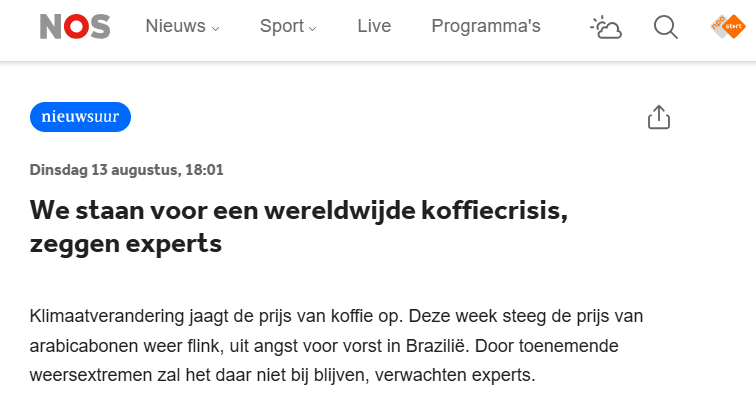
Dramatic future predicted for coffee
This month it was all over the news, even on primetime TV — the Coffee Apocalypse! Journalists and pundits were predicting the dramatic collapse of the coffee industry. And it was all because of climate change.
Yes, climate change affects coffee, but the real cause is different! We agree that the Coffee Apocalypse will indeed come if we do nothing. But for years we have been saying something different: Poverty causes deforestation, and deforestation causes climate change.
Our climate interventions focus on more money for the farmer, because any climate intervention that does not focus on transforming poor farmers into profitable entrepreneurs lacks business logic and is therefore not sustainable. With Moyee FairChain Coffee, we are building, together with you, the business model of the future.
Read below how we do this with our 1. forest protection and 2. agroforestry reforestation program in Ethiopia.
1. Forest Protection
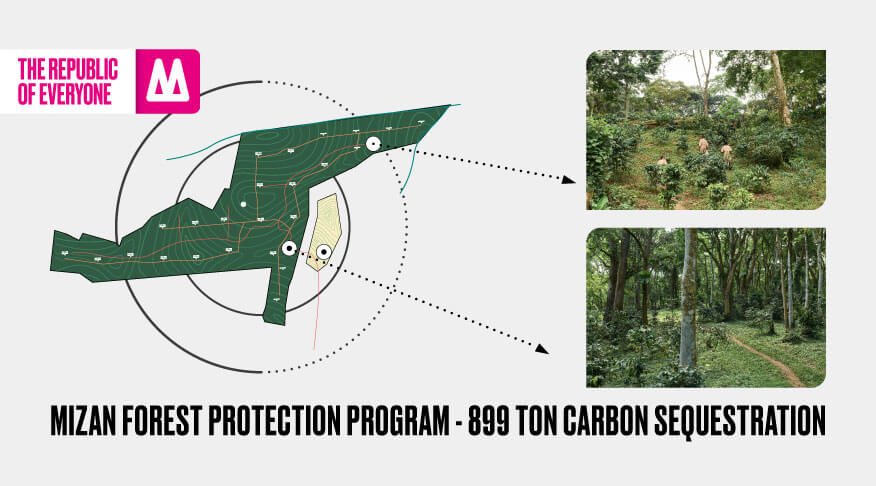
Plenty of problems, plenty of solutions too
Coffee is a major source of deforestation worldwide because it yields too little. In Ethiopia too, millions of hectares of forest have been cut down for corn, teff or cattle farming.
To demonstrate that coffee can also make a positive contribution to forest conservation, we have adopted 224 hectares of coffee forest in Ethiopia together with The Republic of Everyone to experiment with economies of scale while preserving biodiversity and increasing labor productivity leading to a living wage for everyone.
The farm is completely digitalized so that all interventions can be quantified and verifiably tracked.
Every year we remove 899 tons of CO2 from the air with the Mizan farm. That's enough to charge your smartphone 107,880,000 times, or drive 2,247,500 kilometers in your classic car.
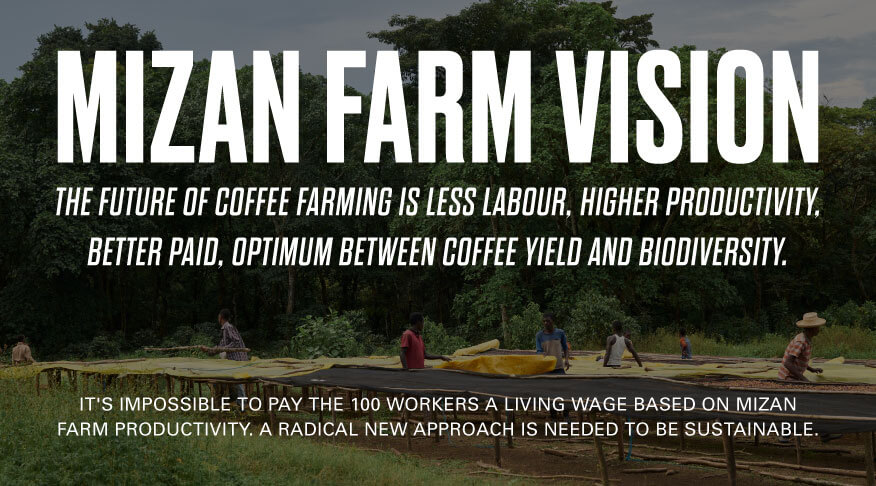
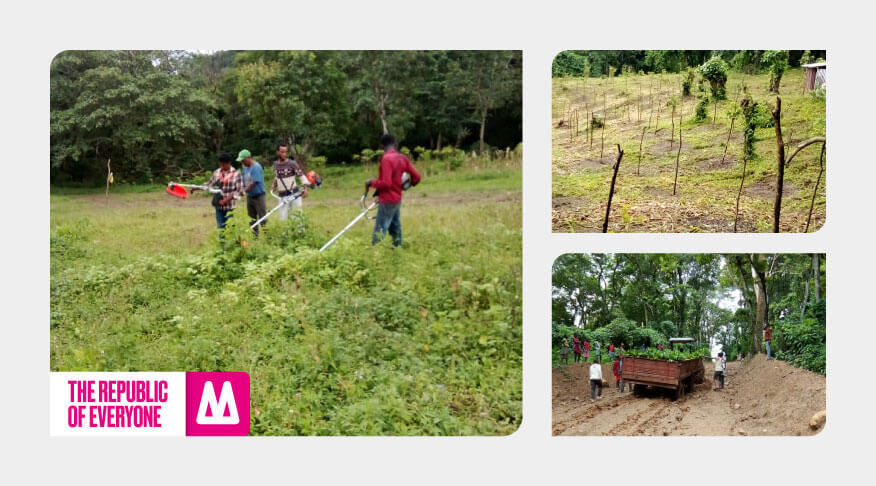
Increasing labor productivity as a basis for higher wages
Millions of coffee farmers live below the poverty line. Of course, because the coffee trade refuses to share the money it earns with the farmers, but also because production costs are too high and labor productivity too low.
Currently, the weeds between the coffee trees are cut manually. In addition to the heavy nature of this work, productivity is too low to generate a living wage. The introduction of brush cutters and hand tractors will triple productivity.
While we wait for solar powered equipment to be strong enough, we have been planting Jatropha plants en masse. The seeds are almost immediately suitable to replace traditional fossil fuels. Jatropha is common in East Africa and is often used as a boundary marker or hedge. We have implemented a program to purchase Jatropha oilseeds from our outdoor growers and nearby villagers to further increase their living income and keep our operations carbon positive!
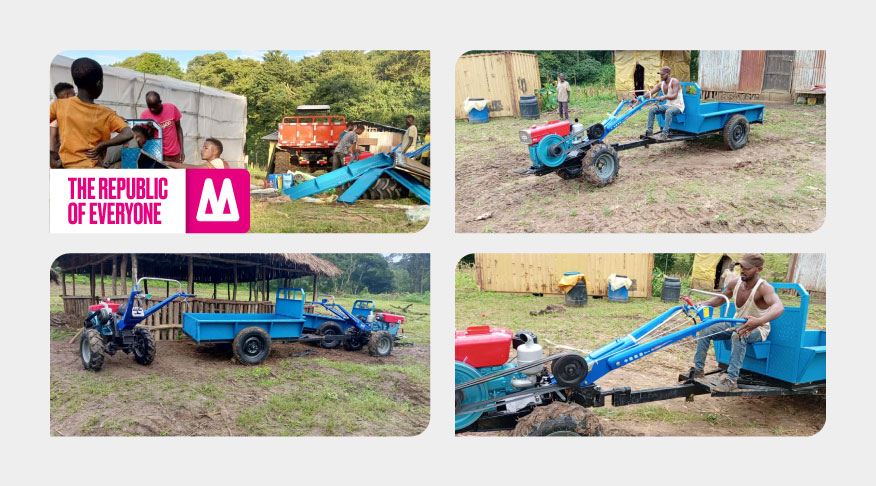

Replacing traditional African drying beds with Colombian drying beds
It’s hard to imagine, but too much rain is just as problematic as drought. Mizan has always been Ethiopia’s water tower, but the increased rainfall due to climate change is causing the blossoms to fall off the coffee plants, leading to lower productivity. And the traditional way of drying coffee using African drying beds requires the coffee to be covered constantly during rains. Extremely unproductive!
It took a year to convince them, but the team finally built their first “solar drying chamber” which doubles the drying capacity per m² by using 2 tiered beds, reduces drying time by 33%, radically improves productivity per employee and ensures the consistent quality that you as a Moyee drinker have come to expect.
The greenhouse has been tested on corn and will be used for coffee during the harvest period, with the ambition to build 10 more next year, including at our Limu Wet Mill sites.
2. Agroforestry Reforestation
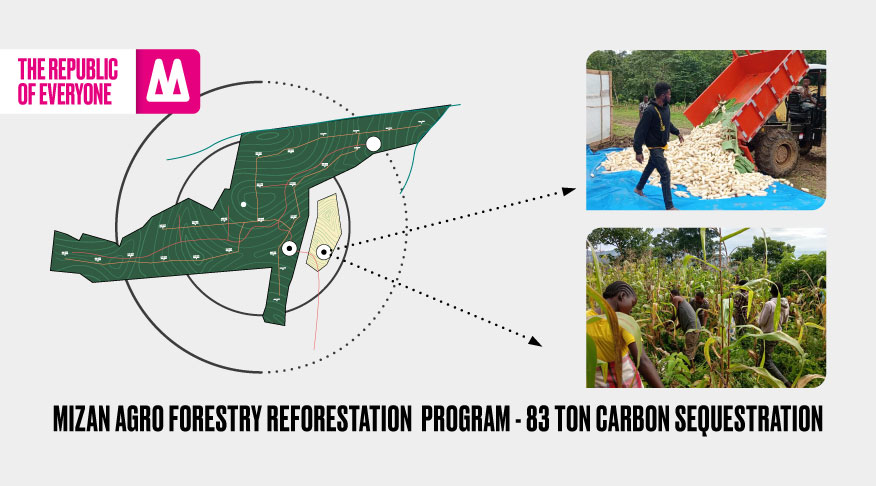
From poverty farmers to profitable farmers
In Dutch it allitrates a lot less but is no less impressive. All our climate interventions are aimed at turning poor farmers into profitable entrepreneurs, so that they can become partners in protecting existing forests, reforestation and promoting biodiversity.
In addition to the 224 HA coffee forest, we have also adopted a piece of logged forest, together with The Republic of Everone, to realize an agroforestry blueprint that shows that incomes can be doubled, productivity can be increased, agricultural costs can be reduced, child labor can be eliminated and income dependency on one crop can be removed. And yes, that also results in increased biodiversity and reforestation.
And look at the new tractors gleaming as they collect the corn that feeds the farmers.
This first piece removes 83 Tons of Co2 from the air. That's 11,454 meat meals or 83 flights Amsterdam New York. No idea what you're doing there but still.
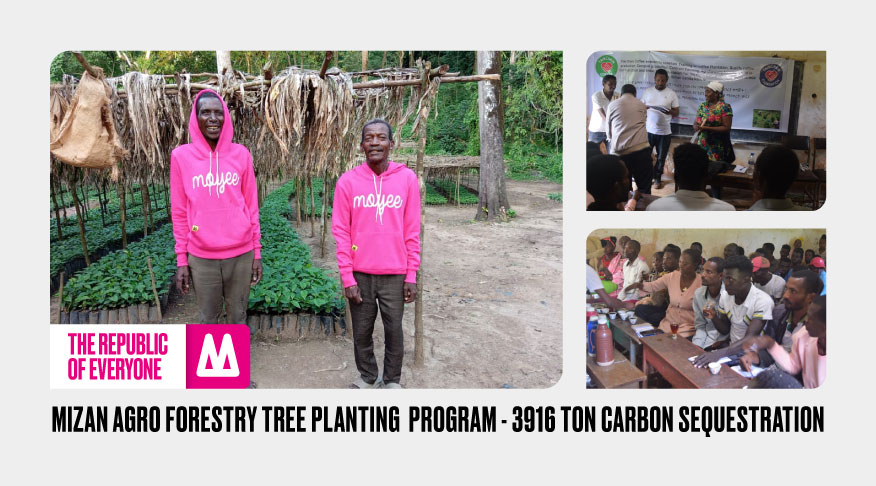
Less coffee is better for the farmer.
The agroforestry blueprint that has been realized on the piece of deforested land is also the place where the knowledge transfer is organized to hundreds of coffee farmers. Several trainings have been given and our well-known treeplant program has also been adapted to help with the transition to a less coffee-dependent model that doubles income, increases productivity, reduces production costs, eliminates child labor and removes income dependency on one crop. In addition to coffee plants, our outgrowers treeplant program now also supplies mango, avocado, vanilla, pepper and other crops.
In the meantime, 108,784 plants have been planted, with which we absorb 3,916 tons of CO2 from the air. My goodness, 35,244 solar panels have to generate electricity for a year. Unbelievable that there are still Tesla drivers and Musk worshippers who would rather finance the flight to Mars than clean up mother earth.
Not you, right? Join our next mission. Return on assets AND a clean planet!
Return on capital AND a clean planet!
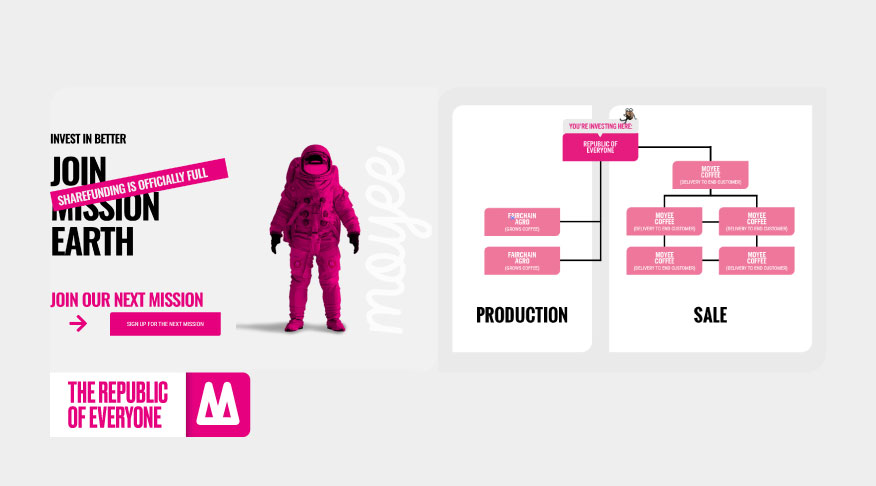
We can't help but keep repeating that Moyee didn't start to sell coffee, but to radically reorganize the coffee chain. System change, so to speak.
Over the past decade, we have perfected our holistic FairChain impact model in the coffee industry. We warned the Big Coffee dinosaurs to stop their planet-plundering activities and adopt our regenerative impact model. Adapt or die!
But as we expected, they didn't listen. So now it's time to drop our FairChain meteor on their little heads and wipe them out.
As we prepare to bring our Kenyan operations under The Republic and scale to double in size next year, please share the sign-up page with your friends and family to invite them to our epic, profitable, and insanely impactful next mission .

